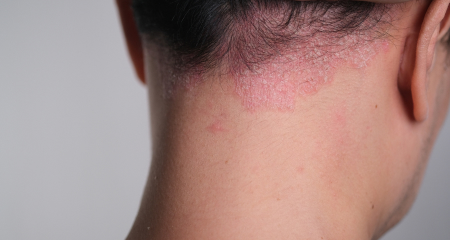
Psoriasis, characterized by itchy, painful plaques, not only impacts your physical health but can deeply affect your self-esteem and overall quality of life. For those seeking in-depth psoriasis care, the board-certified dermatologists at Northstar Dermatology in Texas are committed to providing you with compassionate care and extensive experience in crafting treatments tailored to your distinct skincare needs. Schedule your appointment using the online system or ring the office directly.
Psoriasis is an inflammatory condition marked by the increased turnover of skin cells which leads to thick, red, scaly plaques. The body’s immune system creates abnormal signals or “cytokines” that cause skin cells to proliferate aberrantly. The causes of psoriasis are still being studied, but as with many chronic inflammatory conditions, there is an interplay between genetic or hereditary factors and various environment triggers, including infections and certain medications. Psoriasis may appear at any age and affects 1-2% of the population. Psoriasis is not a contagious condition.
Psoriasis may present in patterns as varied as diffuse widespread redness to small puss-filled bumps affecting the hands and feet. Approximately 20-30% of patients may present with psoriatic arthritis. Psoriasis may also affect the fingernails and toenails, often being mistaken for toenail fungus.
Plaque Psoriasis (aka Psoriasis Vulgaris): The most common type of psoriasis, plaque psoriasis typically affects the back of the scalp, elbows, knees, and gluteal cleft (the skin at the top of the buttocks). Plaques may or may not be itchy, and in more severe cases, may crack and bleed.
Inverse Psoriasis: This is a pattern of psoriasis wherein plaques will affect the skin folds: armpits, belly button, groin, and under the breasts. Since plaques occur in areas prone to moisture, they are less thick and often, not scaly.
Guttate Psoriasis: “Guttate” describes rain-drop like spots or smaller plaques that may affect the entire body. This manifestation of psoriasis may follow a streptococcal infection.
Palmar-Plantar Psoriasis: This a particularly debilitating presentation with involvement of the palms and soles. Plaques may fissure and cause significant pain and discomfort.
Pustular Psoriasis: This is a relatively rare form of psoriasis that is marked by the appearance of small pustules, often in the setting of other symptoms such as fever. Pustular psoriasis may be result from certain infections, medications, pregnancy, or the rapid taper of corticosteroids. There are different variants of pustular psoriasis which may present with widespread disease as in von Zumbusch type or exanthematic psoriasis, or more localized disease as in palmoplantar pustular psoriasis or acrodermatitis continua of Hallopeau.
Erythrodermic Psoriasis: Erythroderma describes the rapid progression of psoriatic lesions to affect nearly the entire skin. This may pose a medical emergency, as the widespread inflammation can lead to significant insensible water loss and resultant dangerous heart conditions.
The following do not necessary cause psoriasis but may trigger flares in individuals who have the condition or are otherwise genetically predisposed:
Treatment is dictated by multiple factors, including the extent or severity of disease as well as a patient’s other medical history, including immune status, history of malignancy, and other medications the patient
may be taking. As such, at Northstar Dermatology, we always believe a thorough history and physical exam is critical in determining the appropriate treatment.
Fortunately, a number of treatments exist and newer, more effective and more targeted therapies are constantly under development.
Topical Therapy
Topical medications have long been the backbone of treatment. Topical corticosteroids in various strengths function as anti-inflammatory agents. Common topical steroids in include hydrocortisone, desonide, triamcinolone, mometasone, betamethasone and clobetasol among others. Adjunctive therapy exists in the form of calcipotriene (a vitamin D analog), tazarotene (a topical retinoid), and steroid sparing agents such as tacrolimus, pimecrolimus, and topical roflumilast (Zoryve).
Phototherapy
Treatment typically entails exposure to certain wavelengths of UV radiations called UVB or narrow band UVB.
Systemic Medications
For moderate to severe psoriasis cases that are unresponsive to other treatment or with disease that is too widespread to treat with topicals alone, we consider treatment with either oral or injectable medications. Oral medications may include cyclosporine, methotrexate, or Otezla. Larger molecule medications referred to as “biologics,” are also available in injectable forms. Examples of these medications include infliximab (Remicade), etanercept (Enbrel), adalimumab (Humira), certolizumab (Cimzia), secukinumab (Cosentyx), ixekizumab (Taltz), guselkumab (Tremfya), tildrakizumab (Ilumya), rsankizumab (Skyrizi), and ustekinumab (Stelara) amongst others. These medications, while generally considered safe, do require lab monitoring and regular follow up as they necessarily modulate some component of the immune system.
For a treatment plan that is right for you, please feel free to reach out to us or book an appointment online today.
